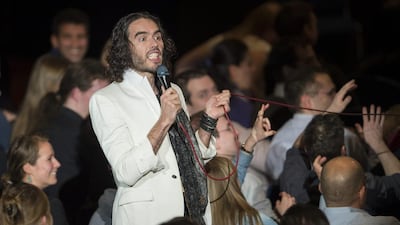Revolutions, and revolutionaries, are sexy. The thrill of change, of upheaval, of a possible new world both excites and motivates.
The reality of revolution, however, as the Arab Spring showed, can be much uglier and far more brutal: pain and fear, a daily lack of stability, and constant low-level, but very real, uncertainty. It is not a path to be embarked upon lightly, and certainly not without a clear vision.
The comedian Russell Brand is currently thrilling audiences with his book on revolution. His anger flows eloquently through the book’s pages as he rails against (quite real) injustices of the modern world. Both the public and the media have lapped up his rhetoric, as well as his delivery.
But while Brand raises many interesting and legitimate questions about politics and society, he cannot, in the end, offer structurally coherent answers. That, to bring the revolution back to the Middle East, is both the tragedy of the Arab Spring and the reality of ISIL.
Brand’s book contains many interesting ideas, in particular about the disproportionate power of corporations to influence democratic governments. He also offers some solutions, suggesting individuals should better organise for their collective good and that governments should legislate to cap the profits of global corporations.
But what the book lacks is an organising principle that can pull these elements together.
Both political ideologies and societies need organising principles. In the end, complex urbanised societies cannot be run merely on good intentions nor on simple formulations of love, peace and harmony. There has to be a system to regulate such complexity. To think otherwise is to relegate those with the least power in any society to a Hobbesian world. This isn’t a theory: humans have tried it.
In no way does that mean the current systems in democracies are perfect: Brand makes very reasonable criticisms of the current system. Whether he is talking about the exploitation of people and the planet by global capitalism, the tight-knit camaraderie of politicians and the media, or the securitisation of society, he is right on the facts.
The criticisms are real. But he does not have an architecture that supports his answers. It isn’t enough merely to have discrete criticisms and shards of solutions. His is a roadmap to revolution but not a vision of the society at the end of it.
If that sounds familiar, it is because most of the Arab Spring countries suffered from the same problem. A reality of economic stagnation, corruption and state brutality motivated Egyptians, Tunisians, Yemenis and Libyans to demonstrate, sacrifice and eventually topple their governments and regimes.
But after the dust had settled, there was no real organising principle behind the protests. The revolution had no clothes.
That was in the nature of the beast – the Arab revolutions were genuinely leaderless and people-led. And the accumulation of decades of political repression meant there were no political parties able to formulate alternatives. But the lack of an organising principle was a reality that needed to be, and is still being, confronted.
The most coherent vision of a society that existed after the revolutions was that of the Muslim Brotherhood. But one by one, the Arab Spring countries rejected that vision: first Libya and Yemen, then Egypt and most recently Tunisia. The organising principle itself existed but it wasn’t one that worked for or was wanted by the society. There were simply too many flaws.
Contrast that with ISIL, whose dark vision of the world is both coherent and has proven persuasive to thousands of people. The organising principle of ISIL makes sense for so many jihadis – at least for now. The nihilistic vision of society towards which their foot soldiers are trudging appears to provide answers at the moment. To them, it is only on the other side of that path that the true depravity of ISIL’s society will be clear.
The lack of such certainty is the unfortunate failing of both Arab Spring countries and Brand’s piecemeal politics. It is a real shame, because both the western democracies that Brand writes about and the people of the overthrown Arab autocracies deserve more.
But criticisms without clear vision are not alternatives, they are merely punchlines. Revolutions are not to be lightly advocated, especially when those who will go to – and die on – the barricades are other people’s children. It is particularly incumbent on revolutionaries of the pen such as Brand to remember that it will be other people who, for the sake of their certainties, will die by the sword.
falyafai@thenational.ae
On Twitter: @FaisalAlYafai


